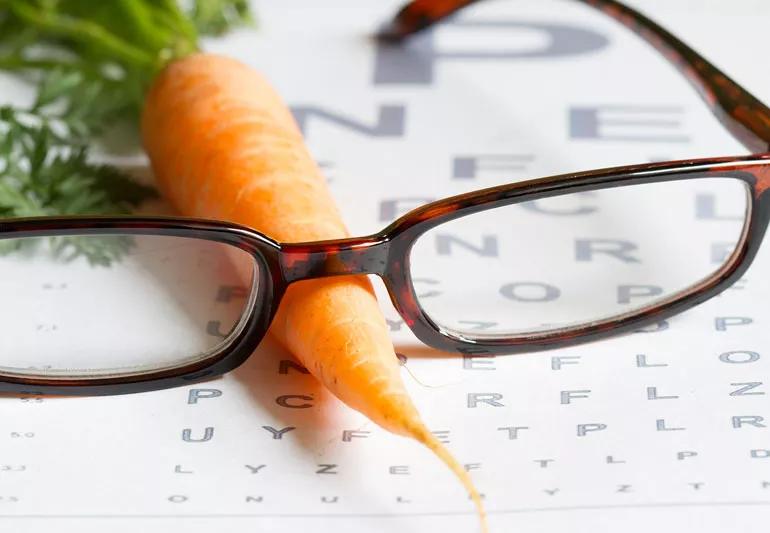The answer depends on your condition

Image content: This image is available to view online.
View image online (https://assets.clevelandclinic.org/transform/93cf29fb-1e2c-4216-85b8-8903ace5e37f/eyeHealth-940433026-770x533-1_jpg)
eye health eat healthy vitamins
Eye issues can stem from a variety of different things and there’s no question that vitamin deficiencies can cause eye problems. You may ask yourself: Do I need vitamins or supplements as a result?
Advertisement
Cleveland Clinic is a non-profit academic medical center. Advertising on our site helps support our mission. We do not endorse non-Cleveland Clinic products or services. Policy
If your diet is missing the key vitamins or nutrients you need on a day-to-day basis — or you have a diagnosed deficiency that increases your disease risk — your doctor may recommend taking supplements.
“But for most people, they aren’t necessary for eye health,” says ophthalmologist Richard Gans, MD. “You can get the vitamins you need through your diet. And there is little evidence connecting vitamin supplements with improved eye health.”
There’s one exception for a specific eye condition: Age-related macular degeneration (AMD). If you have AMD, talk to your ophthalmologist about whether supplements are appropriate.
Research has shown that people with AMD might benefit from taking specific vitamins. Another study determined that taking certain vitamins in high concentrations slows the progression of this condition in a large percentage of people. However, the study notes that taking these vitamins can only slow the disease. Unfortunately, no vitamins can prevent it from forming in the first place.
The National Eye Institute updated their guidelines recently for AMD in their study called the AREDS 2 (Age Related Eye Disease Study) with the following recommendations:
Advertisement
Be sure to consult with your doctor first before taking any supplements.
For other eye conditions, the evidence is limited.
“Many simply haven’t been evaluated as thoroughly as AMD with regard to diet and nutrition, so there’s no strong recommendation for taking vitamin supplements for them,” Dr. Gans says. “As for glaucoma, there is little evidence that vitamins have any impact on this condition.”
One study found that omega-3s from fish oil supplements didn’t have any beneficial results for dry eye and were no better than a placebo.
In general, it’s best to eat a diet with a full complement of nutrition to ensure you aren’t vitamin-deficient. That’s true not only for your eye health, but also for your overall health.
For example, leafy green vegetables such as spinach, kale, mustard greens and others offer many of the vitamins and nutrients that are good for eye health.
Likewise, if you want to boost your omega-3 intake, you can find it in fatty fish and many types of nuts and seeds. Sprinkle nuts and seeds onto your salads or eat them as snacks to get a quick boost of nutrients.
Carrots are also high in vitamin A, which is important in retina metabolism. To reap the benefits, get your daily dose of vitamin A by munching on carrots during your busy day.
“But beyond vitamin A, carrots don’t hold any magical properties for eye health,” says Dr. Gans. “That may come as a surprise if you were told growing up that rabbits never wear glasses.”
Advertisement

Sign up for our Health Essentials emails for expert guidance on nutrition, fitness, sleep, skin care and more.
Learn more about our editorial process.
Advertisement
They claim to boost energy and improve longevity, but there’s currently not enough research to confirm these benefits
Certain supplements, like licorice root and St. John’s wort, can raise your blood pressure or negatively interact with medication
Properly prepared, elderberries can be a safe and healthy part of a balanced diet — just steer clear of supplements
Science doesn’t support most claims about this bee byproduct, and supplements have potential risks
The meat-based elimination diet restricts important food groups — like fruits and vegetables — that keep you healthy
Eat your fill of vitamins C, B6 and E, plus zinc and selenium
The vitamins, minerals and other nutrients in the food you eat are essential for a healthy heart, but supplements are another story
Early research shows that this supplement may help, but more studies are needed
Prioritize your health by managing stress, strengthening your social connections and getting quality sleep
Bolsters, blankets, pillows and blocks can offer extra support, stability and comfort
Allergies, postnasal drip, asthma or reflux could be to blame for a cough that won’t quit